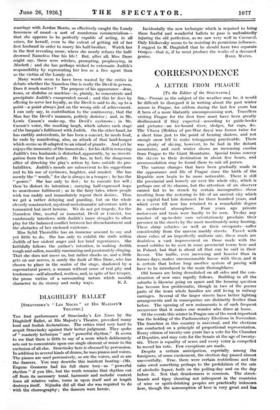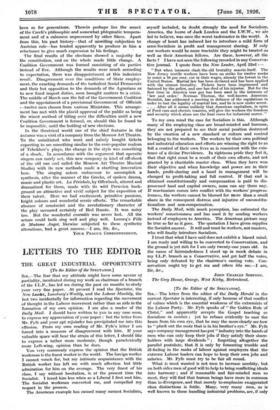CORRESPONDENCE
A LETTER FROM PRAGUE [To the Editor of the SPECTATOR.]
Sm,—Prosaic as the subject of the weather may be, it would be difficult to disregard it in writing about the past winter season in Prague, for seldom during the last few years has it been of a more blatantly uncompromising sort. Travellers visiting Prague for the first time must have been greatly disillusioned if they expected—according to guide-books and pictures—an ice-bound river, sledges, fur caps, &c. The Vltava (Moldau of pre-War days) was frozen twice for a short time just to the point of bearing skaters, and not enough snow fell to make tobogganing practicable. There was plenty of ski-ing, however, to be had in the distant mountains, and each winter shows an increasing exodus from Prague to the Giant Mountains. Special trains convey the ski-era to their destination in about five hours, and accommodation may be found there to suit all purses.
The various changes that have been gradually made in the appearance and life of Prague since the birth of the Republic now begin to be more noticeable. There is still the provincial and homely air over the whole city, which is perhaps one of its charms, but the attention of an observer cannot fail to be struck by certain incongruities—those resulting from the restoring to life of an ancient city which as a capital had lain dormant for three hundred years, and which even till now has retained to a remarkable degree its mediaeval atmosphere. Four years ago private motor-cars and taxis were hardly to be seen. To-day any number of up-to-date cars ostentatiously proclaim their presence in the streets by the most inordinately noisy hooting. These shiny vehicles—as well as their occupants—suffer considerably from the uneven muddy streets. Paved with stone cubes of an imperfectly uniform size, these roads arc doubtless a vast improvement on those made with the round cobbles to be seen in some provincial towns here and in Poland, but that is about all that can be said in their favour. The traffic, ever increasing and heavier than in former days, makes unconscionable havoc with them, and it is certain that before long another system of paving will have to be introduced in the main thoroughfares.
Old houses are being demolished on all sides and the con- struction of new ones rapidly follows. Building in all the suburbs is likewise going on apace and the housing question has become less problematic, though in two of the poorer parts of the town whole families are still living in railway carriages. Several of the larger streets have better lighting arrangements and in consequence are distinctly livelier than before. The opening of new restaurants is of such frequent occurrence that it makes one wonder who dines at home.
Of the events this winter in Prague one of the most important
was the holding of the Parliamentary Elections in November. The franchise in this country is universal, and the elections are conducted on a principle of proportional representation. Every citizen of twenty-one years has a vote for the Chamber of Deputies, and may vote for the Senate at the age of twenty- six. There is equality of sexes and every voter is compelled to record his vote. Few exceptions are made.
Despite a certain anticipation, especially among the foreigners, of some excitement, the election day passed almost uneventfully. True, there were certain restrictions and the calm owed something perhaps to the prohibition of the sale
of alcoholic liquor, both on the polling-day and on the day before it. Not that drunkenness is common. The street- brawls and tipsy shouting not infrequent , in the countries of wine or spirit-drinking peoples are practically imknork here, though the consumption of beer is very great and has
been so for generations. Therein perhaps lies the secret of the Czech's philosophic and somewhat phlegmatic tempera- ment and of a calmness unpossessed by other Slays. Apart from this, his past history—that of unwilling subjection to Austrian rule—has tended apparently to produce in him a reluctance to give much expression to his feelings. '
The final results of the elections showed a majority for the constitution, and on the whole made little change. A Coalition Government was formed consisting of six parties instead of five. Although the results were much according to expectation, there was disappointment at this - indecisive result. Disagreement over the conditions of State employ- ment, the exacting demands of the turbulent Social Democrats and their hot opposition to the demands of the Agrarians as to new fixed import duties, soon brought matters to a crisis. The middle of March saw the fall of the Government Coalition and the appointment of a provisional Government of Officials —twelve men chosen from various Ministries. This arrange- ment has met with the placid approval of the public as being the wisest method of tiding over the difficulties until a new Coalition Government is formed, or, should this be found to be impossible, until the holding of new elections.
In the theatrical world one of the chief features in the autumn was a visit of a company from the Moscow Art Theatre. To the uninitiated who went and calmly bought tickets expecting to see something similar to the ever-popular realism of Tchekhov's plays, the change in the style was something of a shock. In accordance with the argument that operatic singers can rarely act, this new company (a kind of off-shoot of the old one and called the Moscow Art Theatre Musical Studio) with its new methods made a startling innovation here. The singing actors endeavour to accomplish a synthesis, after the manner of the Greeks, of spoken drama, music and plastic art. La Perichole, by Offenbach, altered and dramatized for them, made with its wild Peruvian back- ground an attractive and vivid subject for the exposition of their talent. Here we had excitement, primitive passions, bright colours and wonderful scenic effects. The remarkable absence of constraint and the revolutionary character of the play savoured certainly of Red Russia. It was noisy too. But the wonderful ensemble was never lost. All the actors could both sing well and play well. Lecocq's Fille de Madame Angot, likewise subjected to these synthetic alterations, had a great success.—I am, Sir, &c.,
YOUR PRAGUE CORRESPONDENT.











































 Previous page
Previous page